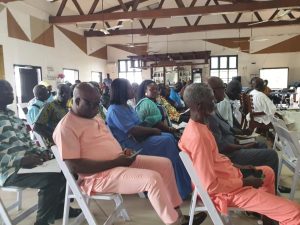By Juliet Aguiar DUGBARTEY Takoradi
The Tree Crops Development Authority (TCDA) has issued a directive making registration and licensing of all rubber value chain actors compulsory.
The move forms part of a comprehensive reforms aimed at strengthening compliance, enhancing traceability, and positioning Ghana’s rubber industry for global competitiveness.
The Authority explained that new systems, including the introduction of a conveyance certificate and mandatory export permits, will ensure accountability at every stage of the value chain.
“These measures are not mere bureaucracy. They are safeguards to protect farmers, secure fair trade, and uphold Ghana’s reputation worldwide,” the Authority stressed.

Chief Executive Officer (CEO)of TCDA, Andy Osei Okrah gave the directive in an address read for him by Deputy CEO-Operations, Rich Kofi Tuo at the Annual General Meeting (AGM) of the Association of Natural Rubber Actors of Ghana (ANRAG) in Takoradi.
The meeting was attended by diverse actors-farmers, processors, exporters, traders, service providers, and allied businesses from the Western, Eastern and Central Regions. It was on the theme “Strengthening Ghana’s Rubber Value Chain through Unity, Innovation and Sustainability. From farm to industry-growing together for global competiveness”.
Beyond regulation, the CEO announced steps to expand production. “Under the Ghana Tree Crops Diversification Project, two million high-quality rubber seedlings will be distributed to farmers to expand cultivation and boost productivity. Farmers will also benefit from strengthened extension services and the adoption of modern agronomic practices to ensure environmental sustainability”.
He emphasized that Ghana must look beyond raw material exports to unlock the full potential of the rubber industry.
He highlighted value addition as the next frontier, moving beyond the export of Technically Specified Rubber (TSR) into the production of tyres, gloves, adhesives, medical products, and other industrial materials.
“The true wealth of rubber lies in finished goods. By scaling up processing and downstream manufacturing, we will create thousands of jobs, retain more value within Ghana, and position our country as a hub for rubber-based industries in West Africa,” he stated.
Mr. Okrah identified trade promotion and market access as key priorities and stressed the need to secure stable international and regional markets, pursue certification systems to boost competitiveness, and actively showcase Ghanaian rubber at global trade fairs.
He also urged the development of mechanisms to cushion farmers against global market volatility.
He underscored the importance of collaboration across the value chain, urging stakeholders to work closely with TCDA and ANRAG through constructive dialogue rather than media confrontations.
“The seeds we plant today in governance, compliance, research, investment, and industrialization will sustain Ghana’s prosperity for generations to come,” he added
President of ANRAG
Emmanel Akwesi Owusu, President of ANRAG, acknowledged that the natural rubber sector faces numerous challenges, including pricing and sustainability concerns, inadequate investment in processing, and compliance with emerging international regulations such as the EU Deforestation Regulation (EUDR). However, he was quick to point out the enormous opportunities that exist particularly in value addition, export diversification, environmental sustainability, and wealth creation in rubber-growing communities.
He explained that the association’s key priorities include championing the welfare of smallholder farmers, attracting investment into downstream industries, and strengthening sustainability and traceability systems to meet international market requirements.
“Our goal is to ensure that Ghana does not only remain a producer of natural rubber, but becomes a competitive player on the global stage,” he emphasized.
Vice President of WRHC
The Vice President of the Western Regional House of Chiefs (WRHC) and Omanhene of Lower Dixcove, Nana Kwesi Agyemang XI, called for an immediate ban on the export of raw rubber from Ghana.
He noted that the practice is crippling local processors and undermining the country’s industrialization agenda.
He expressed concern about the growing export of unprocessed rubber at a time when domestic factories are struggling to secure adequate raw materials.
“The House is very concerned. We are aware of the shortage of raw rubber for local processors, and we believe there should be no export until there is enough supply locally. We are considering a formal engagement with the Minister for Trade, the Minister for Lands and Natural Resources, and other stakeholders to address this,” he stated.
He cited the example of Ghana Rubber Estates Limited (GREL), which has been forced to scale down operations from a three-shift system to just one due to the lack of raw material.
“This situation underlines the urgent need for a policy review,” Nana Agyemang stressed.










